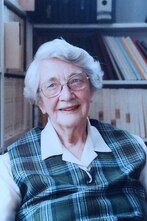FLORA GARRY (1900-2000)

Flora Garry one of the leading writers in Scottish Literature. She was born Flora MacDonald Campbell was born at the farm of Auchmunziel near the Parish of New Deer, in Aberdeenshire, on the 30th of September 1900 and died at the age of 100 on the 16th of June 2000.
She came from the farming lands of Buchan and blazed an illustrious academic trail via New Deer School and Peterhead Academy - later to Aberdeen University. Both her parents were writers, her mother a playwright and her father a local journalist. Flora trained and worked as a teacher, wrote stories and drama for radio.
As a student she would wander up the Chanonry, near the University of Aberdeen, past the professors' homes in the evening, observe the colourful dinner parties and contrast them with the humbler life of her farming folk. She put these observations into a poem called The Professor's Wife’ – and then one day found herself in the role of that same wife. Flora married Robert Garry, a young doctor at Glasgow Western Infirmary, who was the driving force behind the introduction of insulin to Scotland. He went on to become Regius Professor of Physiology at the University of Glasgow from 1947 to 1970. It was only after he retired that Flora began publishing the many works she had already created.
She was a pensioner before her poetry began to appear in book form. In 1974 her first book, ‘Bennygoak and other Poems’ was published by Akros. Flora had been writing away quietly and privately since the wartime days. Although a gifted writer in English, it was in her native Buchan tongue, Doric, that she came into her own. She rightly resented the fact that such an expressive language should be consigned to the lower order and banned from use in schools.
''Scots is my mither tongue,'' she would say, ''associated with all sorts of cherished memories -of home, landscape, folk, work, weather, songs, stories.''
Even now, 22 years after her passing, Flora remains in the hearts and minds of those who cherish the language and heritage of the North East of Scotland. Flora Garry is one of the leading ‘makars’ and ‘scrievers’ in Scottish literature - she holds the breath of authenticity within her writing. Her words and observations of her beloved Buchan countryside and farming community, spoke of the people she knew - and she knew their worth. But she didn’t just observe the day-to day life of her community in the Buchan heartland - she was very much part of that community.
In an interview recorded by broadcaster Frieda Morrison at her home in Comrie, Perthshire - Flora explained the background to the impetus that lay behind her writing - the love of the land and the unique qualities of the people with whom she shared the braid lands o Buchan. She explained: “
She came from the farming lands of Buchan and blazed an illustrious academic trail via New Deer School and Peterhead Academy - later to Aberdeen University. Both her parents were writers, her mother a playwright and her father a local journalist. Flora trained and worked as a teacher, wrote stories and drama for radio.
As a student she would wander up the Chanonry, near the University of Aberdeen, past the professors' homes in the evening, observe the colourful dinner parties and contrast them with the humbler life of her farming folk. She put these observations into a poem called The Professor's Wife’ – and then one day found herself in the role of that same wife. Flora married Robert Garry, a young doctor at Glasgow Western Infirmary, who was the driving force behind the introduction of insulin to Scotland. He went on to become Regius Professor of Physiology at the University of Glasgow from 1947 to 1970. It was only after he retired that Flora began publishing the many works she had already created.
She was a pensioner before her poetry began to appear in book form. In 1974 her first book, ‘Bennygoak and other Poems’ was published by Akros. Flora had been writing away quietly and privately since the wartime days. Although a gifted writer in English, it was in her native Buchan tongue, Doric, that she came into her own. She rightly resented the fact that such an expressive language should be consigned to the lower order and banned from use in schools.
''Scots is my mither tongue,'' she would say, ''associated with all sorts of cherished memories -of home, landscape, folk, work, weather, songs, stories.''
Even now, 22 years after her passing, Flora remains in the hearts and minds of those who cherish the language and heritage of the North East of Scotland. Flora Garry is one of the leading ‘makars’ and ‘scrievers’ in Scottish literature - she holds the breath of authenticity within her writing. Her words and observations of her beloved Buchan countryside and farming community, spoke of the people she knew - and she knew their worth. But she didn’t just observe the day-to day life of her community in the Buchan heartland - she was very much part of that community.
In an interview recorded by broadcaster Frieda Morrison at her home in Comrie, Perthshire - Flora explained the background to the impetus that lay behind her writing - the love of the land and the unique qualities of the people with whom she shared the braid lands o Buchan. She explained: “
“I don’t think I could have written about anything else than the land as I knew when I was growing up on the farm there in the middle of Buchan. “That was what I felt I could write about; it was in me to write about the land and the folk there and the work and the weather and everything there. |
Listen to Flora Garry speak with Frieda Morrison on Scots Radio
Flora was aware that in a century that began with the horse – she was privileged to observe and be part of a unique way of life - she was also watching it disappear like the mists descending on the hill o Bennachie. In her poem 'Figures Receding' Flora speaks of the inevitability of change and with it the disappearance of that generation of people fae that wee North-East corner o Scotland:
There’s twa wyes o kennin |
Flora’s poetry is grown from the braid lands o Buchan and her life growing up in the community around the fairm-toun of Auchmunziel, In the expressive language of her beloved Doric - North-East Scots; she conjured up the scenes of a unique generation, bringing the scent of the fields, the darg o the glaur an weet - the deuks, the byre and the midden, and the soon o the teuchat on a summer's day. Flora remains a redoubtable shining light of the Doric language and its authenticity, and remains one of the most cherished figures of the North_East of Scotland.
References:
Flora Garry on Doric Literature Powww.thedoric.scot/flora_garry.htmlrtal at www.thedoric.scot/flora_garry.html
Flora Garry on Scottish Poetry Library at www.scottishpoetrylibrary.org.uk/poets/flora-garry/
Entry written by Frieda Morrison.
References:
Flora Garry on Doric Literature Powww.thedoric.scot/flora_garry.htmlrtal at www.thedoric.scot/flora_garry.html
Flora Garry on Scottish Poetry Library at www.scottishpoetrylibrary.org.uk/poets/flora-garry/
Entry written by Frieda Morrison.



